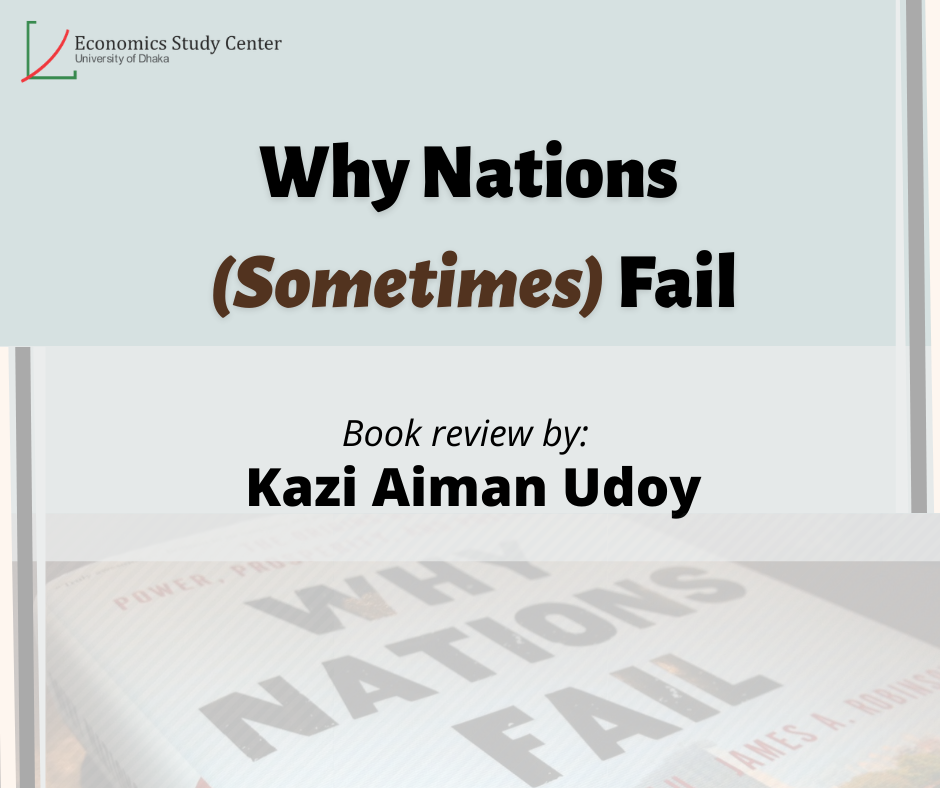ECONOMICS STUDY CENTER, UNIVERSITY OF DHAKA
|
Kazi Aiman Udoy Typically, I'm genuinely positive about the books I audit, yet here's one I truly disagreed with. Why have a few nations flourished and made incredible day to day environments for their residents, while others have not? This is a subject I care very much about, so as of late I was anxious to get a book on precisely this point. Why Nations Fail: The Origins of Power, Prosperity, and Poverty is easy to read but difficult to peruse, with bunches of fascinating verifiable tales about various nations. It makes a contention that is urgently basic: nations with "inclusive" (as opposed to "extractive") political and monetary establishments are the ones that succeed and make due over the long haul. At last, however, the book is a significant disillusionment. I found the authors' investigation ambiguous and oversimplified. Past their "inclusive versus extractive" perspective on political and monetary foundations, they to a great extent, excuse every single other factor—history and rationale in any case. Significant terms aren't generally characterized, and they never clarify how a nation can move to have more "inclusive" organizations. The authors show a strangely oversimplified world view when they characterize the decay of Venice to a decrease in the inclusiveness of its organizations. The truth of the matter is, Venice declined in light of the fact that opposition went along. The adjustment in the inclusiveness of its foundations was more a reaction to that than the wellspring of the issue. Regardless of whether Venice had figured out how to save the inclusiveness of their organizations, it would not have compensated for their loss of the flavor exchange. At the point when a book attempts to utilize one hypothesis to clarify everything, you get irrational models this way. Another amazement was the authors' perspective on the decay of the Mayan human progress. They propose that infighting—which demonstrated an absence of inclusiveness—clarifies the decay. Be that as it may, that disregards the essential explanation: the climate and water accessibility decreased the profitability of their rural framework, which sabotaged Mayan pioneers' professes to have the option to bring great climate. Acemoglu and Robinson contend that when you consolidate spoiled systems, exploitative elites and self-serving foundations with slightly decentralized states, you have something near a solution for destitution, struggle and even by and large disappointment. The authors accept that political "inclusiveness" must start things out, before development is attainable. However, most instances of financial development over the last 50 years—the Asian supernatural occurrences of Hong Kong, Korea, Taiwan, and Singapore—occurred when their politics tended more towards 'eliteness'. At the point when confronted with such huge numbers of models where this isn't the situation, they recommend that development isn't maintainable where "inclusiveness" doesn't exist. Be that as it may, much under the best conditions, development doesn't continue itself. I don't think even these authors would propose that the Incomparable Sadness, Japan's present disquietude, or the worldwide budgetary emergency of the most recent couple of years came about in view of a decrease in inclusiveness. The authors have an issue with present day China in light of the fact that the progress from Mao Zedong to Deng Xiaoping didn't include a change to make political organizations more inclusive. However, China, by most measures, has been a wonder of supported monetary development. I think nearly everybody concurs that China needs to change its governmental issues to be more inclusive. In any case, there are a huge number of Chinese whose way of life has been fundamentally improved as of late, who might most likely differ that their development was "extractive." I am definitely more hopeful than the authors that proceeded with slow change, without precariousness, will keep on moving China the correct way. The authors end with a tremendous assault on an unfamiliar guide, saying that more often than not, under 10% gets to the expected beneficiaries. They refer to Afghanistan for instance, which is deluding since Afghanistan is a combat area and help was sloped up rapidly with war-related objectives. There is little uncertainty this is the least viable unfamiliar guide, yet it is not really a reasonable model. As an endnote, I should make reference to that the book alludes to me in a positive light. Acemoglu and Robinson have run the dangers of aspiration, and rightly so. For a book about terrible science and some horrid situations, "Why Countries Fail" is a shockingly dazzling read. This is, in each sense, a major book. Perusers will trust that it has a major effect.
0 Comments
Leave a Reply. |
Send your articles to: |


